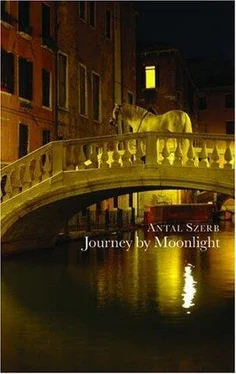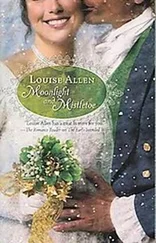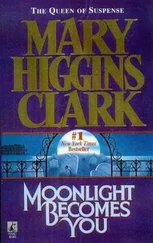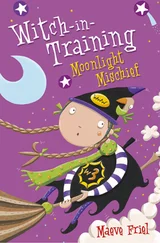“The more she neglected me, the stronger was my feeling of what I called, for want of a better word, love. It seems I had a real bent at that time for hopeless gestures: standing around by her gate at night to spy on her as she came home with her laughing and noisy crowd of admirers; neglecting my studies; spending all my money on stupid presents which she didn’t even acknowledge; being cravenly sentimental and creating unmanly scenes if I met her. That was my style. Then I was truly alive. No joy I ever experienced afterwards ever ran as deep as the pain, the exulting humiliation, of knowing I was lost for love of her and that she didn’t care for me. Is that what you call love?”
(“Why am I saying all this? Why? … Once again I’ve drunk too much. But I had to tell her at some stage, and she isn’t really taking it in … ”)
“Meanwhile the delay Éva had been granted was coming to its end. Old Ulpius would occasionally burst into her room and make terrible scenes. In those days he was never sober. The fiancé himself appeared, with his greying hair and apologetic smile. Éva asked for one more week. So that she could go away with Tamás, in a calm atmosphere, so they could take their leave of one another. Somehow money was found for the journey.
“Off they went, to Hallstatt. It was late autumn. There wasn’t a soul there besides them. There’s nothing more funereal than an old historical watering place like that. A castle or cathedral might be ancient, past its time, crumbling away here and there. It’s natural, that’s its function. But when that sort of place, a coffee-house or a promenade, designed for the pleasures of the moment, when that shows its impermanence — there’s nothing more ghastly.”
“Yes, yes,” said Erzsi, “just get on with it. What happened to Tamás and Éva?”
“My dear, if I beat about the bush and philosophise, it’s because from that point on I don’t know what happened to them. I never saw them again. In Hallstatt Tamás Ulpius poisoned himself. This time he made no mistake.”
“And Éva?”
“You mean, what part did she have in Tamás’s death? Perhaps none. I’ve no way of knowing. She never returned. It was said that after he died some high-ranking foreign officer came and took her away.
“Perhaps I might have been able to meet her. Once or twice in the following years there might have been a chance. From time to time János would pitch up out of the blue, make obscure reference to the fact that he could possibly arrange for me to see her, and would be happy to do so I if I would reward his services. But by then I had no desire to meet Éva. That’s why János said earlier tonight that it was my fault, because I walked out on the friends of my youth, when all I had to do was hold out my hand … He was right. When Tamás died I believe I went out of my mind. And then I decided I would change, I would tear myself away from the spell. I didn’t want to go the way he went. I would become a respectable person. I left the university, trained for my father’s profession, went abroad to get a better grasp of things, then went home and worked hard to become just like everyone else.
“As regards the Ulpius house, my sense of impermanence was not misplaced. Everything was destroyed. Nothing was left. Old Ulpius didn’t live long after. He was beaten to death while making his way home drunk from a bar on the outskirts of town. The house had earlier been bought by a rich fellow called Munk, a business friend of my father’s. I visited there once. It was awful. They’d fitted it out wonderfully, as if it were much older than it really was. There’s now a genuine Florentine well in the courtyard. The grandfather’s room became an Altdeutsch dining-room with oak panelling. And our rooms! My God, they turned them into some sort of old Hungarian guest house or God knows what, with painted chests, jugs and knick-knacks. Tamás’s room! Talk about impermanence … Holy God, it’s so late! Sorry, love, but I had to tell you all this at some time, no matter how stupid it might sound from the outside … Now, I’m off to bed.”
“Mihály … you promised to tell me how Tamás Ulpius died. And you haven’t told me why he died.”
“I haven’t told you how he died because I don’t know. And why he died? Hmmm. Perhaps he was bored to death. Life can be really boring, no?”
“No. But let’s get some sleep. It’s very late.”
IN FLORENCE their luck ran out. It rained the whole time they were there. As they stood outside the Cathedral in their raincoats Mihály suddenly burst into laughter. He had just understood the complete tragedy of the building. There it rose in its unparalleled beauty, and no-one took it seriously. For tourists and art-historians it had become a landmark, and no-one gave it a second thought. No-one believed in it, or that its purpose there was to proclaim the glory of God and the city.
They went up to Fiesole, and watched a storm hurrying with busy speed over the hills to overtake them. They retreated inside the monastery and viewed the copious oriental bric-a-brac which the pious brothers had brought back from their missions over the centuries. Mihály stood in wonder for some time over a series of pictures from China. It took him several minutes to work out what they represented. In the upper part of each an alarmingly ferocious Chinaman sat enthroned, with a large book before him. What gave the face its special ferocity was the hair flaring upwards from the temples on either side. In the lower half, all sorts of gruesome events were taking place: people being tossed with pitchforks into some ghastly liquid; some having their legs sawn off; someone whose intestines were being drawn out, very carefully, like a rope; and in one a contraption like an automobile, driven by a monster with flying hair, attacking a crowd of people and chopping them up with blades attached to its snout.
It suddenly struck him that this was the Last Judgement, as seen by a Chinese Christian. What craftsmanship, and what objectivity!
He began to feel faint and went out into the square. The landscape, so magical when viewed from the train between Bologna and Florence, was now damp and hostile, like the face of a weeping woman with the make-up peeling off.
When they arrived back in Florence Mihály went to the main Post Office. Since Venice, their mail had been directed there. On one of the envelopes addressed to him he recognised the hand of Zoltán Pataki, Erzsi’s previous husband. Thinking it might contain something better not seen by her, he sat down with it outside a café. “There’s male solidarity for you,” he thought, with a smile.
The letter ran as follows:
Dear Mihály,
I know it’s a bit much, my writing you a long and friendly letter after you ‘seduced and ran off with’ my wife, but you never were a conventional sort of chap, and so perhaps you won’t be shocked if I too disregard convention just this once, even though you’ve always branded me an old conformist. I’m writing to you because I won’t be at rest until I do. I’m writing to you because, quite honestly, I don’t see why I shouldn’t, since we are both perfectly aware that I’m not angry with you. We only keep up the appearance because it’s better for Erzsi’s self-esteem to have the romantic situation where we are locked into deadly enmity over her. But between ourselves, my dear Mihály, you are well aware that I always thought highly of you, and this hasn’t changed simply because you ‘seduced and ran off with’ my wife. Not as if this ‘crime’ of yours hasn’t left me absolutely distraught. I needn’t deny — this of course is strictly between us — how much I still adore her. But I realise you aren’t responsible for that. As a general fact — don’t take this amiss — I don’t believe you’re responsible for anything I can think of in the whole world.
Читать дальше












